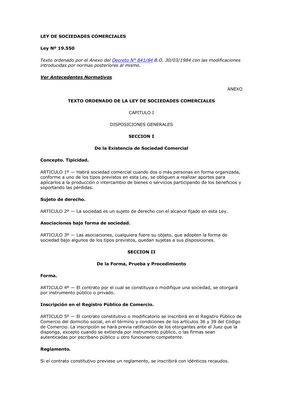Summary
The Ley General de Sociedades N° 19.550 T.O. 1984 in Argentina is the primary law that regulates the formation, organization, and operation of companies in the country. The law establishes the legal requirements for different types of companies, including partnerships, limited liability companies, and corporations. It outlines the minimum number of shareholders, the need for bylaws, and the rules for corporate governance, while also defining the obligations of shareholders and directors, including their fiduciary duties and the requirement to disclose conflicts of interest. The law provides for the protection of minority shareholders and the rights of creditors, emphasizing transparency and accountability in corporate reporting. Companies are required to maintain accurate accounting records and prepare financial statements in accordance with GAAP. These financial statements must be audited by an independent auditor and presented to shareholders at the annual general meeting. Furthermore, companies must disclose certain information to shareholders and the public, such as changes in share capital, significant contracts, and related party transactions. Shareholders have the right to access company records, attend general meetings, and ask questions about the company's financial situation.

We have sent you the download link, please check your inbox.
Download againSomething went wrong when trying to download this file.
Try again